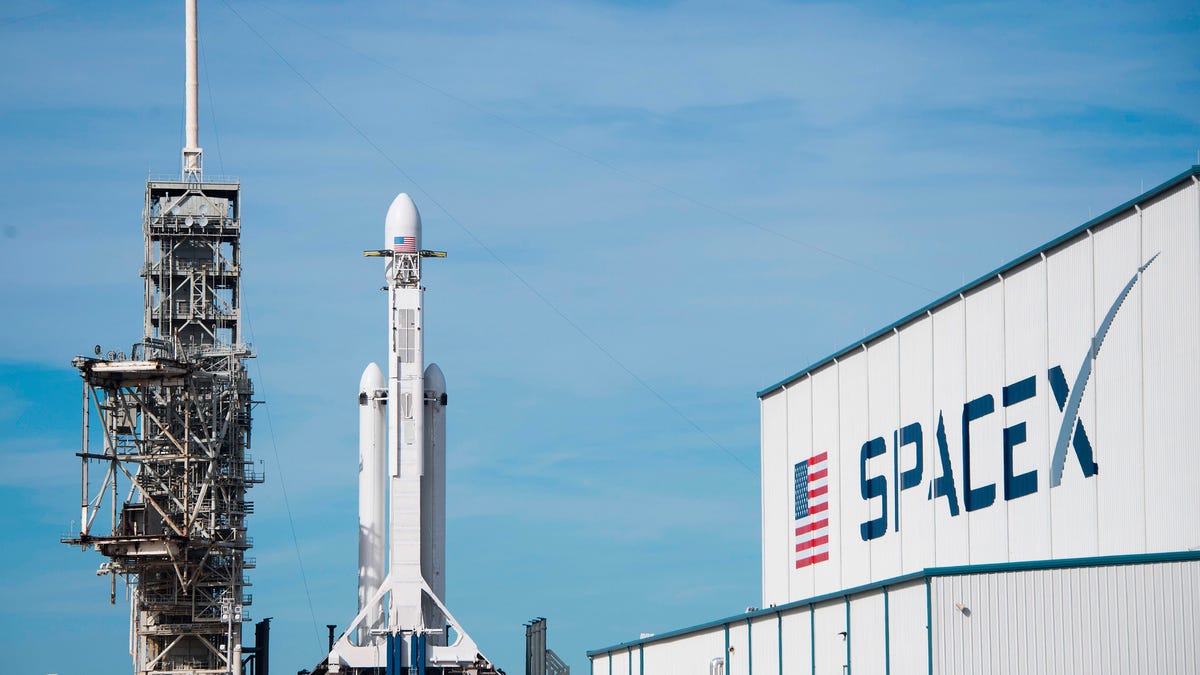SpaceX to lay off 10 percent of its workforce
The company says it needs to be "leaner" to accomplish ambitious goals.

The SpaceX Falcon Heavy rests on a launch pad at the Kennedy Space Center in 2018.
SpaceX plans to lay off 10 percent of its 6,000-employee workforce, citing a need to be a "leaner company" to meet its ambitious goals.
Elon Musk's company maintains it's financially strong but needs the staff reductions to ensure it can accomplish long-term goals of deploying satellite-based broadband service and transporting humans to other planets.
"To continue delivering for our customers and to succeed in developing interplanetary spacecraft and a global space-based Internet, SpaceX must become a leaner company," the company said in a statement Friday. "Either of these developments, even when attempted separately, have bankrupted other organizations. This means we must part ways with some talented and hardworking members of our team."
"We are grateful for everything they have accomplished and their commitment to SpaceX's mission," the company continued. "This action is taken only due to the extraordinarily difficult challenges ahead and would not otherwise be necessary."
The SpaceX layoffs were reported earlier Friday by the Los Angeles Times.
Musk, who also serves as CEO of Tesla and the Boring Company, founded SpaceX in 2002 "to revolutionize space technology, with the ultimate goal of enabling people to live on other planets." In 2014, the company won a $2.6 billion contract from NASA to ferry astronauts to the International Space Station.
Central to Musk's vision is recycling rockets to make cheaper, more rapid launches to orbit. The goal of SpaceX missions is to push a payload into space and then return the rocket boosters to Earth each time so they can be reused on future missions.
Many of SpaceX's recent launches have focused on getting a constellation of Iridium communications satellites into orbit. On Friday, a SpaceX Falcon 9 rocket blasted off from Vandenberg Air Force Base in California, carrying 10 satellites. Referred to by SpaceX as "one of the largest 'tech upgrades' in space history," the global communications system is expected to enable advanced satellite broadband services and aircraft surveillance and tracking.
The Hawthorne, California-based company also plans to provide global broadband services through 4,425 low-Earth orbit satellites. The goal of the plan, which won FCC approval last year, is to provide low-latency broadband to rural and remote places with little or no internet access and to improve speeds and coverage in areas with so-so access.
But perhaps Musk's most audacious ambitions lie in interplanetary space travel, namely putting humans and a city on Mars. A SpaceX plan teased in August calls for an unmanned, robotic mission to Mars as soon as 2022, followed by the first human flight to the red planet a few years later.
Since early 2017, SpaceX has also been talking up plans to send tourists around the moon. In September, those plans appeared to take a leap forward when Musk named Yusaku Maezawa, a 42-year-old Japanese billionaire, as its first lunar tourist.
NASA turns 60: The space agency has taken humanity farther than anyone else, and it has plans to go further.
Taking It to Extremes: Mix insane situations -- erupting volcanoes, nuclear meltdowns, 30-foot waves -- with everyday tech. Here's what happens

